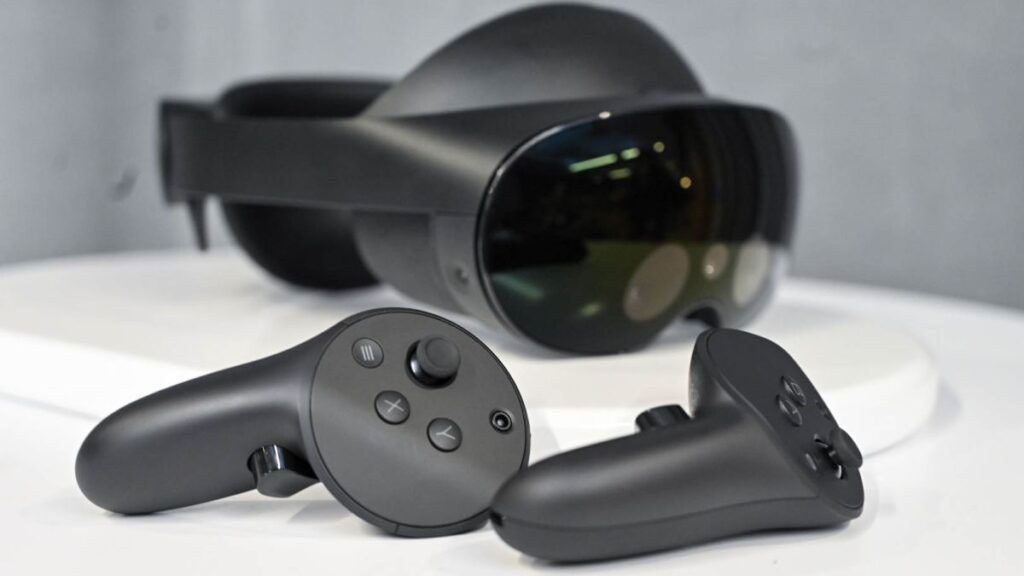Meta CEO Mark Zuckerberg has unveiled the all-new Quest Pro(formerly Project Cambria), a premium $1500 Meta Quest Pro VR Headset, at Meta’s annual Connect conference.

The $1,500 headset, which was presented at Meta’s Connect Conference, will be available to buy from October 25. Users can also place pre-orders on the Meta website. The launch is a part of Meta’s strategy to grow its user base.
Since its release in 2020, the Quest Pro’s predecessor, the Quest 2, had a sale of around 15 million units. Unlike its predecessor, Quest Pro supports mixed reality, allowing users to view digital content overlaid on the actual world.
Mark Zuckerberg, CEO of Meta, called mixed reality “the next major step for VR.”
Meta Quest Pro is the first in a lineup of cutting-edge headsets designed to increase the potential of mixed and virtual reality. The headset’s pancake lenses compress light multiple times, resulting in smaller overall dimensions and crisper sights. Overall, the Meta Quest Pro headset is more ergonomic and balanced because of the new, flared battery on the back.
The device is powered by the Qualcomm Snapdragon XR2+ processor. It offers 256GB of internal storage and 12GB of RAM. In order to provide users with a full-color mixed reality and virtual environment, it features ten high-resolution sensors, five of which are located within the headset and five outside.
There are two LCD panels that provide richer, more vibrant colors due to the local dimming and quantum dot technology. Meta Quest Pro’s design enables users to switch between the physical and virtual worlds while using their peripheral vision. If the user desires an immersive experience, magnetic partial light blocks are included in the box. It contains sensors for detecting the eyes and capturing facial expressions.
For a richer virtual experience, if the person raises an eyebrow, grins, or just engages in eye contact with somebody, their avatar does the same. To track the user’s position in 3D space independently of the headset, the headset contains three built-in sensors for each controller. In comparison to Meta Quest 2, Meta Quest Pro provides 10% more pixels per degree and 37% more pixels per inch.
Additionally, users will notice a 50% improvement in the periphery of the screen and a 25% rise in full-field visual acuity in the center. The color spectrum has also increased by 1.3 times from the previous version. The device comes with rechargeable batteries and a TruTouch Haptics system.
The Quest Pro has a battery life of one to two hours, though users can also use the device while it’s charging. According to Meta, a complete battery charge will take about two hours.
Microsoft CEO and Chairman Satya Nadella also joined Zuckerberg to reveal a brand-new partnership that will bring potent new work and productivity features to Meta Quest Pro and Meta Quest 2 in the coming years. These tools include apps for Microsoft Teams and Windows 365 as well as the capability to attend a Teams meeting from within Meta Horizon Workrooms.
Most likely, Apple’s rumored AR/VR headset will compete with Meta’s newest headset. The advancement of Meta’s headsets is essential to the company’s plans for the Metaverse, wherein Mr. Zuckerberg envisions a brand-new internet where users can play and work together.
Metaverse is a virtual environment where users may both conduct their daily lives as avatars and explore fantastical virtual worlds. Although several IT companies are developing their metaverses, it will probably be years before any are materialized. There have been conflicting reviews of Meta’s current virtual reality environment, Horizons, and there have also been allegations of sexual assault and violence committed by avatars there.

I am a law graduate from NLU Lucknow. I have a flair for creative writing and hence in my free time work as a freelance content writer.